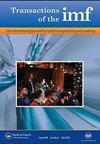Cu2-xS镀层形成的一些规律
IF 1.5
4区 材料科学
Q4 ELECTROCHEMISTRY
Transactions of The Institute of Metal Finishing
Pub Date : 1999-01-01
DOI:10.1080/00202967.1999.11871273
引用次数: 4
摘要
铜2 O +铜之间的相互作用(OH) 2吸附过程中Na 2 S 4铜2 x的形成年代涂料通过循环方法调查使用循环伏安法和放射化学的方法(35 S)。(铜2 x年代涂层形成的一个周期的治疗的表面涂布在溶液中铜(I) +铜(II)加氨、rinsing-hydrolysis和硫化作用Na 2 S 4解决方案)。Cu (I) + Cu (II)吸附形成的cu2 x S涂层仅占25%,而s42吸附形成的cu2 x S涂层高达10%。镀层的剩余部分(~ 65%)是由Cu (I)与单质硫S 0 ad +2Cu +→Cu ad + cu2 +相互作用形成的,交换过程是在重复循环过程中发生的,即Cu ad +2(1-x)Cu +→Cu 2-x S ad +(1-x) cu2 +。单质硫应该在硫化阶段通过Cu (I)和Cu (II)多硫化物的单独和混合中间体以及吸附的s42(≤10% S o)的水解过程中形成。本文章由计算机程序翻译,如有差异,请以英文原文为准。
Some regularities of formation of Cu2-xS coatings
The interaction of Cu 2 O + Cu(OH) 2 adsorbed with Na 2 S 4 in the course of formation of Cu 2 x S coatings by a cyclic method has been investigated using the methods of cyclic voltammetry and radiochemistry ( 35 S). (One cycle of Cu 2 x S coating formation consists of the treatment of the surface to be coated in a solution of Cu (I) + Cu (II) ammoniates, rinsing-hydrolysis and sulphidation in Na 2 S 4 solution). Only 25% of the Cu 2 x S coating has been found to be formed due to adsorption of Cu (I) + Cu (II) and up to 10% due to S 4 2 adsorption. The remaining portion (∼ 65%) of the coating is formed due to interaction of Cu (I) with elemental sulphur S 0 ad +2Cu + → CuS ad +Cu 2+ and the exchange occurring in the course of repeating the cycle CuS ad +2(1-x)Cu + → Cu 2-x S ad +(1-x) Cu 2+ . Elemental sulphur is supposed to be formed in a sulphidation stage through individual and mixed intermediates of Cu (I) and Cu (II) polysulphides as well as during the hydrolysis of the adsorbed S 4 2 (≤10% S o ).
求助全文
通过发布文献求助,成功后即可免费获取论文全文。
去求助
来源期刊

Transactions of The Institute of Metal Finishing
工程技术-材料科学:膜
CiteScore
3.40
自引率
10.50%
发文量
62
审稿时长
3 months
期刊介绍:
Transactions of the Institute of Metal Finishing provides international peer-reviewed coverage of all aspects of surface finishing and surface engineering, from fundamental research to in-service applications. The coverage is principally concerned with the application of surface engineering and coating technologies to enhance the properties of engineering components and assemblies. These techniques include electroplating and electroless plating and their pre- and post-treatments, thus embracing all cleaning pickling and chemical conversion processes, and also complementary processes such as anodising. Increasingly, other processes are becoming important particularly regarding surface profile, texture, opacity, contact integrity, etc.
 求助内容:
求助内容: 应助结果提醒方式:
应助结果提醒方式:


